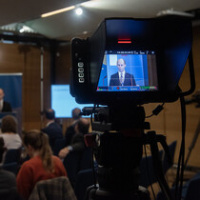2025
Q1 journal list
Muzsnay, A., Szabó, C., Zámbó, C. et al. Retrieval Practice—A Tool to Narrow the Achievement Gap in Learning Higher Mathematics. Int J of Sci and Math Educ (2025)
2024
D1 journal list
Juhász, Á., Sebestyén, N., Árva, D., Barta, V., Pártos, K., Vokó, Z., & Rákosy, Z. (2024). We need better ways to help students avoid the harms of stress: Results of a meta-analysis on the effectiveness of school-based stress management interventions. Journal of School Psychology, 106, 101352.
Bónus, L., Antal, E., & Korom, E. (2024). Digital Game-Based Inquiry Learning to Improve Eighth Graders’ Inquiry Skills in Biology. Journal of Science Education and Technology, 1-17.
Nguyen, L. A. T., & Habók, A. (2024). Tools for assessing teacher digital literacy: a review. Journal of Computers in Education, 11(1), 305-346.
Laihonen, Petteri – Bodó, Csanád – Heltai, János Imre 2024. From grassroots literacy to transliteracies in the educational context of the Moldavian Csángó. Journal of Multilingual and Multicultural Development.
Bodó, Csanád – Fazakas, Noémi – Barabás, Blanka – Lajos, Veronika & the language experts from Lészped 2024. Language experts on a sinking island: critiquing language endangerment rhetorics through participation in and around a tabletop game. Journal of Multilingual and Multicultural Development.
Q1 journal list
Major, David ; Falus, Márton ; Árva, Dorottya ; Eorsi, Daniel ; Terebessy, András ; Tabak, Adam G. ; Fazekas-Pongor, Vince;The effect of school lockdown on well-being and self-esteem of adolescents during the COVID-19 pandemic in Hungary; FRONTIERS IN PUBLIC HEALTH 12 Paper: 1474893 , 13 p. (2024)
Muzsnay, A., Zámbó, C., Szeibert, J. et al. How do testing and test-potentiated learning versus worked example method affect medium- and long-term knowledge in abstract algebra for pre-service mathematics teachers?. Eur J Psychol Educ (2024).
Csányi, R., & Molnár, G. (2024). Item- and person-level factors in test-taking disengagement: Multilevel modelling in a low-stakes context. International Journal of Educational Research Open, 7, December 2024, 100373
Molnár, G. (2024). Learning and Instruction: How to Use Technology to Enhance Students’ Learning Efficacy. Journal of Intelligence 12: 64.
Alrababah, S. A., Wu, H., & Molnár, G. (2024). A Pilot Study for Measuring Complex Problem-Solving in Jordan: Feasibility, Construct Validity, and Behavior Pattern Analyses. SAGE Open, 14(2), 21582440241249884.
Habók, A., Oo, T. Z., & Magyar, A. (2024). The effect of reading strategy use on online reading comprehension. Heliyon, 10(2).
Habók, A., & Nguyen, L. A. T. (2024). A comparative study of language learners’ ICT attitudes and behavior pre-and post-COVID-19. Scientific Reports, 14(1), 600.
Kiss, R., & Csapó, B. (2024). Technology-Based Assessment of Phonological Awareness in Kindergarten. International Journal of Early Childhood.
Q2 journal list
Nguyen, L. A. T., & Habók, A. (2024). An investigation into the relationship between attitudinal and non-attitudinal variables and the utilization of digital technology: the EFL Vietnamese context. Language Learning in Higher Education, 14(1), 57-74.
2023
D1 journal list
Bodó, Csanád – Barabás, Blanka – Botezatu, Isabela – Fazakas, Noémi – Gáspár, Judit – Heltai, János Imre – Laihonen, Petteri – Szabó, Gergely & the Csercsetáre-Invitees 2023. Participatory sociolinguistics across researchers’ and participants’ language ideologies. Critical Inquiry in Language Studies.
Zsákai, A., Rátz-Sulyok, F.Z., Koronczai, B., Varró, P., Tóth, E., Szarvas, S., Tauber, T., Karkus, Z., Molnár, K., 2023. Risk and protective factors for health behaviour in adolescence in Europe. Scientific Reports 13, 18638 (2023).
Molnár, G., & Kocsis, Á. (2023). Cognitive and non-cognitive predictors of academic success in higher education: a large-scale longitudinal study. Studies in Higher Education, 1-15.
Molnár, G. & Greiff, S. (2023). Understanding transitions in complex problem-solving: Why we succeed and where we fail. Thinking Skills and Creativity, 101408.
Kertész, C., Honbolygó, F. First school year tapping predicts children's third-grade literacy skills. Sci Rep 13, 2298 (2023). https://doi.org/10.1038/s41598-023-29367-5
Zsákai, A., Annár, D., Koronczai, B., Molnár, K., Varró, P., Tóth, E., Szarvas, S., Tauber, T., Karkus, Z., Várnai, D. and Muzsnai, Á., 2023. A new monitoring system for nutritional status assessment in children at home. Scientific Reports, 13(1), 4155. doi: https://doi.org/10.1038/s41598-023-30998-x
Kondé Zoltán; Kovács Zoltán; Kónya Eszter. (2023) Modeling teachers’ reactions to unexpectedness LEARNING AND INSTRUCTION: 86 (2023) 101784
Csányi, R. & Molnár, G. (2023). How do test-takers rate their effort? A comparative analysis of self-report and log file data. Learning and Individual Differences, 106, 10234
Nguyen, T. L. A. & Habók, A. (2023). Tools for assessing teacher digital literacy: a review. Journal of Computers in Education. 1-42.
Molnár, G. & Hermann, Z. (2023). Short- and Long-term Effects of COVID-related Kindergarten and School Closures on First- to Eighth-grade Students’ School Readiness Skills and Mathematics, Reading and Science Learning. Learning and Instruction, 83(2), 101706.
Liu, Y., & Pásztor, A. (2023). Survey on the influential demographic factors of Chinese undergraduate students’ critical thinking disposition: Evidence from plausible values. Thinking Skills and Creativity, 50, 101397. https://doi.org/10.1016/j.tsc.2023.101397
Wicaksono, A. G. C., & Korom, E. (2023). Role of inductive reasoning, gender, learning satisfaction, and educational and career preference in predicting scientific competency in high school. Thinking Skills and Creativity, 101376. https://doi.org/10.1016/j.tsc.2023.101376
Q1 journal list
Juliane Schicketanz, Sigrun Kabisch, Péter Bagoly-Simó & Tobia Lakes (2023) Factors that are perceived as supporting or hindering active school travel (AST): go-along interviews with primary school children and their parents, Children's Geographies, DOI: 10.1080/14733285.2023.2269104
Péter Bagoly-Simó (2023) Geography’s unkept promises of education for sustainable development (ESD) on geography’s wasted potential to educate for a more sustainable future, International Research in Geographical and Environmental Education, 32:1, 53-68, DOI: 10.1080/10382046.2023.2158631
Németh, Lilla; Bernáth, László (2023) The Nature of Cognitive Test Anxiety: An Investigation of the Factor Structure of the Cognitive Test Anxiety Scale EDUCATIONAL ASSESSMENT 28 : 1 pp. 27-47. , 21 p. (2023)
Kocsis, Á. & Molnár, G. (2024). Factors influencing academic performance and dropout rates in higher education. Oxford Review of Education, 1-19.
Kiss, R., Szili, K., Csapó, B., & Molnár, G. (2023). Empowering first graders with computer-based training to master pre-reading skills and bridge the learning gap. Education and Information Technologies.
Eichorn, N., Hall, J. L., & Marton, K. (2023). Complex working memory in adults with and without stuttering disorders: Performance patterns and predictive relationships, Journal of Fluency Disorders, 77.
Fejes, J. B. (2023). Unpacking classroom goal structures based on students’ own words. Social Psychology of Education
Fejes, J. B., Jámbori, S., Kasik, L., Vígh, T., & Gál, Z. (2023). Exploring social problemsolving profiles among Hungarian high school and university students. Heliyon, 9(8).
Gosztonyi, Katalin & Varga, Eszter: Teachers’ practices and resources in the Hungarian „Guided Discovery” approach to teaching: presenting and representing „series of problems” In: ZDM –International Journal on Mathematics Education 55: 3 pp. 641-656, (2023)
Hidayatullah, A., & Csíkos, C. (2023). The role of students’ beliefs, parents’ educational level, and the mediating role of attitude and motivation in students’ mathematics achievement. Asia-Pacific Education Researcher
Vig, J., Révész, L., Kaj, M., Kälbli, K., Svraka, B., Révész-Kiszela, K., & Csányi, T. (2023). The Prevalence of Educational Neuromyths among Hungarian Pre-Service Teachers. Journal of Intelligence, 11(2), https://doi.org/10.3390/jintelligence11020031
Szalay, L., Tóth, Z., Borbás, R., & Füzesi, I. (2023). Scaffolding of experimental design skills. Chemistry Education Research and Practice, https://doi.org/10.1039/D2RP00260D
Q2 journal list
Csaba, Szabó ; Csilla, Zámbó ; Anna, Muzsnay ; Janka, Szeibert ; László, Bernáth (2023) Investigating the efficacy of retrieval practice in university mathematics REVISTA DE EDUCACION 401 : 1 pp. 79-96. , 18 p.
Hussein Y. F., & Csíkos, C. (2023). The effect of teaching conceptual knowledge on students’ achievement, anxiety about, and attitude towards mathematics. Eurasia Journal of Mathematics, Science and Technology Education, 19(2), em2226
2022
Q1 journal list
Mohai K, Kálózi-Szabó C, Jakab Z, Fecht SD, Domonkos M, Botzheim J. Development of an Adaptive Computer-Aided Soft Sensor Diagnosis System for Assessment of Executive Functions. Sensors. 2022; 22(15):5880. https://doi.org/10.3390/s22155880
Gosztonyi, Katalin: Series of problems in Cairaut’s Elements of Geometry: intaraction between historical analysis and mathematics education research In: ZDM –International Journal on Mathematics Education 54: 7 pp. 1463-1478, (2022)
Kármán, B., Szekeres, Á., & Papp, G. (2022). Interventions for acceptance and inclusion of people with intellectual disability: A systematic review. Journal of Applied Research in Intellectual Disabilities, 35(3), 641-654.
Patja, K., Huis in ‘t Veld, T., Arva, D. et al. (2022). Health promotion and disease prevention in the education of health professionals: a mapping of European educational programmes from 2019. BMC Medical Education, 22(778), https://doi.org/10.1186/s12909-022-03826-5
Amukune, S., Barrett, K. C., Szabó, N. & Józsa, K. (2022). Development and Application of FOCUS app for assessment of Approaches to Learning in 3-8-year-old children in Kenya: A Design-Based Research Approach. International Journal of Early Childhood, https://doi.org/10.1007/s13158-022-00324-z
Szili, K., Kiss, R., Csapó, B., & Molnár, G. (2022). Computer-based development of reading skills to reduce dropouts in uncertain times. Journal of Intelligence, 10(4), 89. https://doi.org/10.3390/jintelligence10040089
Liu, Y., & Pásztor, A. (2022). Design and Validate the Employer-Employee-Supported Critical Thinking Disposition Inventory (2ES-CTDI) for Undergraduates. Thinking Skills and Creativity, 46, 101169. https://doi.org/10.1016/j.tsc.2022.101169
Amukune, S., Józsa, G., & Józsa, K. (2022). Comparing Executive Functioning in the School Readiness of Hungarian and Kenyan Preschoolers. International Journal of Early Childhood, https://doi.org/10.1007/s13158-022-00331-0
Habók, A., Magyar, A., & Molnár, G. (2022). English as a foreign language learners' strategy awareness across proficiency levels from the perspective of self-regulated learning metafors. Frontiers in Psychology, Sec. Educational Psychology. 13, 867714. https://doi.org/10.3389/fpsyg.2022.867714
Csíkos, C. (2022). Metacognitive and Non-Metacognitive Processes in Arithmetic Performance: Can There Be More than One Meta-Level?. Journal of Intelligence, 10(3), 53. https://doi.org/10.3390/jintelligence10030053
Pásztor, A., Magyar, A., Pásztor-Kovács, A., & Rausch, A. (2022). Online Assessment and Game-Based Development of Inductive Reasoning. Journal of Intelligence, 10(3), 59. https://doi.org/10.3390/jintelligence10030059
Varga, Sz., Pásztor, A., & Steklács, J. (2022). Online Assessment of Morphological Awareness in Grades 2–4: Its Development and Relation to Reading Comprehension. Journal of Intelligence, 10(3), 47. https://doi.org/10.3390/jintelligence10030047
Sukhbaatar, B., & Tarkó, K. (2022). Contextual Factors Impacting School and Pastoralist Family Communication in Rural Mongolia: A Partial Ecological Model. The Qualitative Report, 27(8), 1638–1659. https://doi.org/10.46743/2160-3715/2022.5511
Albert, Á., & Csizér, K. (2022). Investigating individual differences with qualitative research methods: Results of a meta-analysis of leading applied linguistics journals. Studies in Second Language Teaching and Learning, 12, 303–335. https://doi.org/10.14746/ssllt.2022.12.2.6
Csizér, K., Albert, Á., & Piniel, K. (2022). Introduction to the special issue on conducting research syntheses on individual differences in SLA. Studies in Second Language Teaching and Learning, 12, 157–171. https://doi.org/10.14746/ssllt.2022.12.2.1
Pawlak, M., & Csizér, K. (2022). Investigating the use of grammar learning strategies in Hungary and Poland: A comparative study. Applied Linguistics. https://doi.org/10.1093/applin/amac038
Piniel, K., & Zólyomi, A. (2022). Gender differences in foreign language classroom anxiety: Results of a meta-analysis. Studies in Second Language Teaching and Learning, 12, 173–203. https://doi.org/10.14746/ssllt.2022.12.2.2
Wu, Q., & Albert, Á. (2022). The role of teacher-generated, learner-generated, and creative content in Chinese EFL students’ narrative writing: A contextual perspective. Languages, 7(3), 212. https://doi.org/10.3390/languages7030212
Zólyomi, A. (2022). Exploring Hungarian secondary school English teachers’ beliefs about differentiated instruction. Language Teaching Research, Online first. https://doi.org/10.1177/13621688221114780
Oo, T. Z., & Habók, A. (2022). Reflection-based questioning: Aspects affecting Myanmar students’ reading comprehension. Heliyon, 8(7), 1–14. https://doi.org/10.1016/j.heliyon.2022.e09864
Ökördi, R., & Molnár, G. (2022). Computer-Based Intervention Closes Learning Gap in Math Accumulated in Remote Learning. Journal of Intelligence, 10(3), 58. https://doi.org/10.3390/jintelligence10030058
Wu, H., & Molnár, G. (2022). Analysing Complex Problem-Solving Strategies from a Cognitive Perspective: The Role of Thinking Skills. Journal of Intelligence, 10(3), 46. https://doi.org/10.3390/jintelligence10030046
Nguyen, T. L. A., & Habók, A. (2022). Adaptation and validation of a computer-assisted language learning attitude questionnaire in a Vietnamese EFL context: A comparison between online and paper modes of administration. Heliyon, 8(6), https://doi.org/10.1016/j.heliyon.2022.e09743
Liu, Y., & Pásztor, A. (2022). Effects of Problem-Based Learning Instructional Intervention on Critical Thinking in Higher Education: A Meta-Analysis. Thinking Skills and Creativity, 45, 101069. https://doi.org/10.1016/j.tsc.2022.101069
Molnár, G., Alrababah, S. A., & Greiff, S. (2022). How We Explore, Interpret, and Solve Complex Problems: A Cross-National Study of Problem-Solving Processes. Heliyon, 8(1), E08775. https://doi.org/10.1016/j.heliyon.2022.e08775
Habók, A., Magyar, A., & Molnár, G. (2022). Investigating the relationship among English language learning strategies, language achievement, and attitude. Frontiers in Psychology, 13:867714. https://doi.org/10.3389/fpsyg.2022.867714
Magyar, A., Habók, A., & Molnár, G. (2022). Exploring the role of EFL receptive skills and learning strategy usage in the ability to acquire and apply knowledge at the beginning of higher education. Frontiers in Psychology, https://doi.org/10.3389/fpsyg.2022.808546
Pusztai, G., Bacskai, K., & Morvai, L. (2021). Religious values and educational norms among catholic and protestant teachers in Hungary. Religions, 12(10), 1–12. 805. https://doi.org/10.3390/rel12100805
Q2 journal list
Mero-Piedra, A. L., Pesthy, O., & Marton, K. (2023). Effects of a physical education intervention on attention and inhibitory control in Ecuadorian children with intellectual disabilities. Journal of Intellectual Disabilities
Csapodi C, Hoffmann M. (2021) Changes in Mathematics Core Curriculum and Matriculation Exam in the Light of the COVID-19-Shock. Education Sciences. 2021; 11(10):610. https://doi.org/10.3390/educsci11100610
Borsos, Z., Jakab, Z., Stefanik, K., Bogdán, B., & Gyori, M. (2022). Test–Retest Reliability in Automated Emotional Facial Expression Analysis: Exploring FaceReader 8.0 on Data from Typically Developing Children and Children with Autism. Applied Sciences, 12(15), 7759.
Calchei, M., Barrett, K. C., Amukune, S., & Józsa, K. (2022). Comparative Study of Russian- and Romanian-Speaking Students’ Mastery Motivation in the Republic of Moldova. Cogent Education, 9(1), 2143039. https://doi.org/10.1080/2331186X.2022.2143039
Katona, Zs., Tarkó, K., & Berki, T. (2022). First Aid Willingness Questionnaire for Schoolchildren: An Exploratory Factor Analysis and Correlation Study. Children, 9(7), 955. https://doi.org/10.3390/children9070955
Wind, A., & Zólyomi A. (2022). The longitudinal development of self-assessment and academic writing: An advanced writing programme. Language Learning in Higher Education, 12, 185–207. https://doi.org/10.1515/cercles-2022-2046
Csíkos, C., Biró, F., & Szitányi, J. (2022). Incorporating humor into mathematical word problems: Is there a negative effect on students’ performance? International Journal of Instruction, 15(3), 1079–1098. https://doi.org/10.29333/iji.2022.15357a
Wu, H., Rahmat, A. S., Molnár, G. (2022). Inductive and combinatorial reasoning in international educational context: Assessment, measurement invariance, and latent mean differences. Asia Pacific Education Review, 23, 297–310. https://doi.org/10.1007/s12564-022-09750-z
Wafubwa, R. N., & Csíkos, C. (2022). Impact of formative assessment instructional approach on students’ mathematics achievement and their metacognitive awareness. International Journal of Instruction, 15, 119–138. https://doi.org/10.29333/iji.2022.1527a
Karika, T., & Csíkos, C. (2022). A test for understanding simple fractions among 5th grade students at the beginning of lower secondary education. Eurasia Journal of Mathematics, Science and Technology Education, 2022, 18(2), em2081. https://doi.org/10.29333/ejmste/11654
Hidayatullah, A., & Csíkos, C. (2022). Mathematics related belief system and word problem-solving in the Indonesian context. Eurasia Journal of Mathematics, Science and Technology Education, 2022, 18(4), em2094. https://doi.org/10.29333/ejmste/11902
Kovács, K. E., Dan, B., Hrabéczy, A., Bacskai, K., & Pusztai, G. (2022). Is resilience a trait or a result of parental involvement? The results of a systematic literature review. Educational Sciences, 12, 372. 1–18. https://doi.org/10.3390/educsci12060372
Ceglédi, T. H., Fényes, H., & Pusztai, G. (2022). The effect of resilience and gender on the persistence of higher education students. Social Sciences, 11(3), 1-14 93. https://doi.org/10.3390/socsci11030093
Fitriana, L. D., Ekawati, R., & Kovács, Z. (2022). Interventions for acceptance and inclusion of people with intellectual disability: A cross-national study. Journal on Mathematics Education, 13(1), 149–172. https://doi.org/10.22342/jme.v13i1.pp149-172





